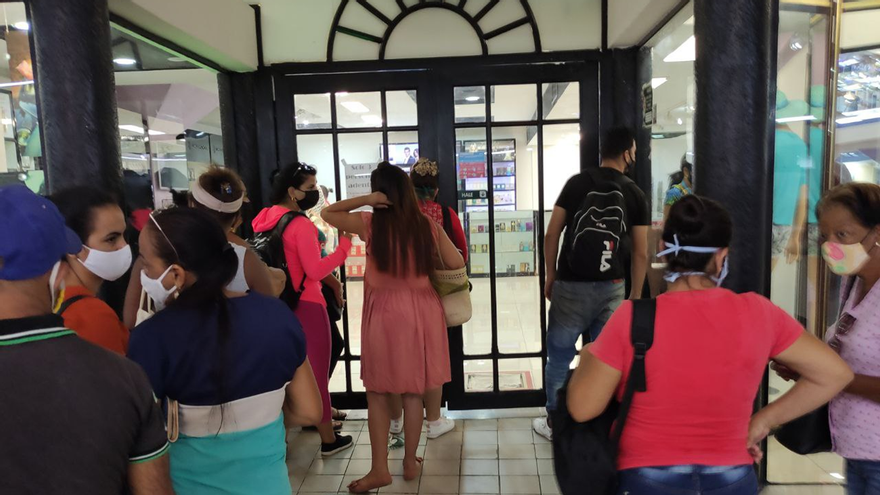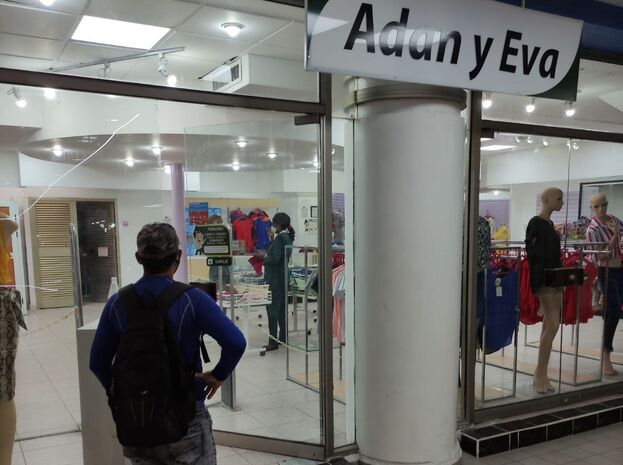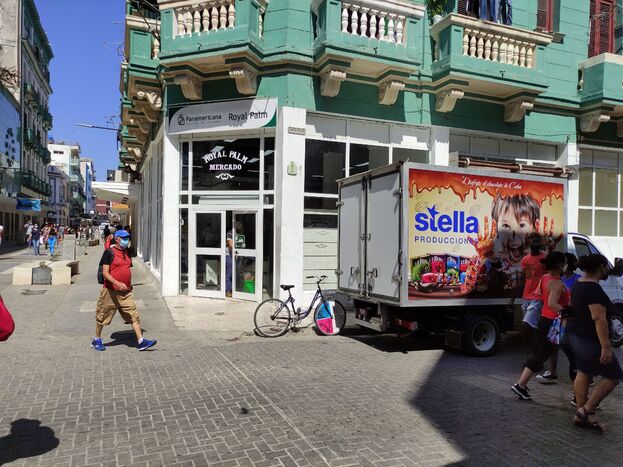
![]() 14ymedio, Juan Diego Rodríguez, Havana, 10 May 2021 — From the outside it still looks the same, but inside the Plaza de Carlos III a silent battle is taking place. On the one hand, the best-stocked stores that accept payment only in foreign currency, and on the other, a few stores that still sell in the national currency. For many Cubans, walking through its corridors is an immersion in the economic divide that separates the island.
14ymedio, Juan Diego Rodríguez, Havana, 10 May 2021 — From the outside it still looks the same, but inside the Plaza de Carlos III a silent battle is taking place. On the one hand, the best-stocked stores that accept payment only in foreign currency, and on the other, a few stores that still sell in the national currency. For many Cubans, walking through its corridors is an immersion in the economic divide that separates the island.
“I entered the stores [that requirement payment] in MLC (freely convertible currency) in Carlos III, I had never visited them closely,” a Havanan told 14ymedio. After touring the stores that take payment only in foreign currency in this centrally located business in the Cuban capital, this Cuban did not know whether to be happy to find products that are barely seen in the other stores or to be saddened by the “monetary apartheid” that separates citizens.
“What a sadness, I have shopped in those stores for about ten years, but now all, except the food supermarket, [accept payment only] in MLC,” he laments. “Even the children’s flip-flops are being sold in dollars.”
“All the Suchel perfumes and also the imported ones, the shampoos that they sold for a lifetime there in the store for 1 CUC, are now also in dollars,” says this 41-year-old Havanan, born in the 1980s when the Soviet subsidy allowed well-stocked markets and better-stocked display windows. “It was a very strange and sad feeling.”
When he was a child, this Havanan knew the Plaza de Carlos III as a market for food and vegetables. “Dirty, but it also had a fish shop with plenty of offerings and you could buy it with the same currency with which they paid us our salaries.” In the 90s the place was reborn under the dollar and was reopened as the main commercial center of the Cuban capital.
Now, the only shopping complex in the country that bears the name of a king of Spain is entering the realm of covert dollarization that has meant opening stores in MLC where you can only pay with magnetic cards. “This reminds me of the ‘Diego Velázquez houses’,” evokes the frustrated customer.

He was referring to the Gold and Silver Exchange Houses, opened on the island in 1987, where valuable jewels were exchanged for vouchers to buy basic necessities. “My grandmother left everything in that scam: her wedding ring, her hanging crucifix that her mother had left her and even some pieces of gold from her teeth,” explains Mabel, a neighbor of the Plaza de Carlos III who now survives by renting her doorway to a self-employed person who does business there.
“At that time it was clear that they were robbing us,” she adds. Hence the name “Diego Velázquez,” the governor whom popular legend describes as the promoter of deceiving the Cuban natives, exchanging national gold for little mirrors brought from the old continent. “That was an assault and this is a new version of the same robbery,” she says.
“Look at where they sell the james, all in MLC stores. The delivery truck has in its advertising a child and everything, how cruel!”, comments another resident of Centro Habana when he realized that they were unloading merchandise from a Stella company truck into the Panamericana Royal Palm store, on the Boulevard of Calle San Rafael. Stella is a trading company that belongs to the government’s Ministry of the Food Industry and markets chocolate products.

“My nephews can practically never eat jams. We do not have dollars and when we buy them it is very little, because we do it on the black market and the resellers sell them at exorbitant prices,” adds the Havanan.
In mid-October, the state newspaper Granma published an article stating that the country “will not dollarize its economy” and that the stores in MLC “are necessary but temporary.” In the article, the official organ of the Communist Party quotes Economy Minister Alejandro Gil, who assures that the monetary system “is designed” so that Cuba “works with a single currency: the Cuban peso.”
Raúl Castro himself, in his report to the Eighth Congress of the Communist Party, acknowledged that “the stores in MLC were created to encourage remittances from abroad.” But, at the same time that they collect foreign exchange, they are generating a deep malaise due to the social inequalities they make obvious.
____________
COLLABORATE WITH OUR WORK: The 14ymedio team is committed to practicing serious journalism that reflects Cuba’s reality in all its depth. Thank you for joining us on this long journey. We invite you to continue supporting us by becoming a member of 14ymedio now. Together we can continue transforming journalism in Cuba.
